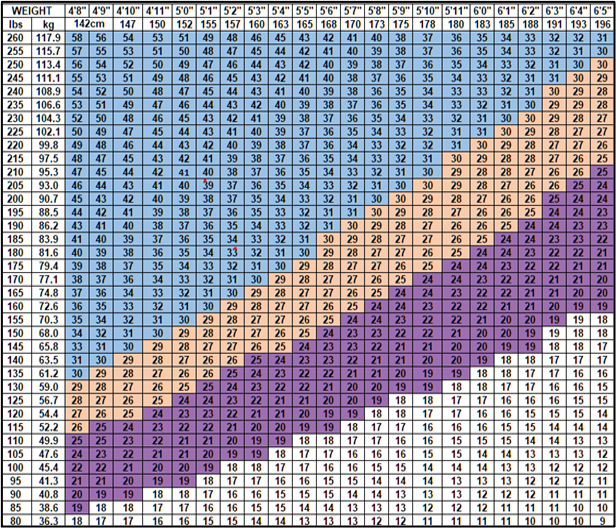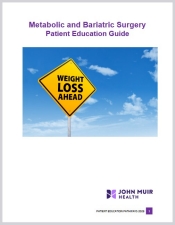Patient Education Resources
What is Obesity?
Obesity is a serious medical condition. The CDC (Centers for Disease Control and Prevention) defines obesity as weight that is higher than what is considered healthy for a given height.
This condition puts you at a very high risk for a host of serious medical problems, including high blood pressure, diabetes, and heart disease. It may also hamper your ability to get around, expose you to possible discrimination or social stigma and may lower your self-esteem.
Please remember three important points:
- Obesity is not a sign of weakness, laziness, or gluttony. It is a serious medical condition with serious medical consequences. Current research suggests that many factors influence your weight. These include genetics, eating habits as a child and as an adult, hormones, and psychological factors.
- You are not alone. Approximately 70 percent of all Americans are considered overweight, about one-third are considered obese, and about five percent are considered morbidly obese. All these numbers are on the rise.
- There is hope. Resources are available to help you avoid the medical consequences of morbid obesity. These include diet and exercise programs, medication, and surgery.
How Do I Know if I am Obese?
A good way to assess your weight is to calculate your Body Mass Index (BMI). Your BMI estimates how much you should weigh based on your height.
See what category you fall into and whether you need to be concerned about your weight. Although your BMI is a simple way to evaluate whether your weight puts you at potential risk for health problems, other factors also may affect your weight. Your health care provider can help you evaluate your BMI and these other factors to determine your overall health picture.
Body Mass Index (BMI) Table for Adults
HEIGHT in feet / inches and centimeters

BMI CLASSIFICATION |
|
Underweight |
<18.5 |
Normal range |
18.5-24.9 |
Overweight |
25.0 – 29.0 |
Obesity |
>30.0 |
Obesity class I |
30.0 – 34.9 |
Obesity class II |
35.0 – 39.9 |
Obesity class III |
>40.0 |
Source: https://www.cdc.gov/obesity/
What Risks Do I Face If I am Obese?
If you are obese, you have a much greater risk of developing a variety of serious medical conditions compared to individuals who are not obese. You may develop health problems at a younger age. Some of these conditions may include:
- High Blood Pressure
- High Cholesterol
- Type 2 Diabetes
- Angina
- Stroke
- Back Pain
- Gallstones
- Gout
- Skin Infections
- Asthma and Obstructive Sleep Apnea
- Heart Disease
- Congestive Heart Failure
- Arthritis
- Bladder Problems
- Kidney Stones
- Carpal Tunnel Syndrome
- Poor Heat Tolerance
- Premature Death
- Menstrual Irregularity and Infertility in Women
- Complications and Infections after Surgery
- Depression and Eating Disorders
Weight Loss Treatment Options
- Lifestyle Modification
- Drug Therapy
- Bariatric Surgery
Goals and Health Benefits of Bariatric (Weight Loss) Surgery
Bariatric surgery has strong results and has been proven to be an effective means to achieve sustainable weight loss. As such, bariatric surgery can improve or resolve many obesity related health conditions such as:
- Type 2 diabetes
- High blood pressure
- High cholesterol
- Osteoarthritis/degenerative joint disease
- GERD
- Non-alcoholic fatty liver disease
- Asthma/Obstructive sleep apnea
- Depression
Who is a Good Candidate for Weight Loss (Bariatric) Surgery?
To qualify for weight loss surgery at our program, you need to meet these criteria:
- You must be 18 years of age or older.
- Have a BMI of 35 or greater with serious comorbidities (medical problems related to obesity) such as type 2 diabetes, heart disease or sleep apnea or BMI of 40 without comorbidities. In some cases, a BMI of 30-34.9 can be considered if the patient meets specific criteria set by the National Institutes of Health (NIH).
- Have tried unsuccessfully to lose weight through a structured, medical weight loss program that includes diet, exercise, and lifestyle changes.
- Undergo a psychological evaluation to determine that you are emotionally healthy enough to understand your decision.
- Be willing and able to commit to long-term medical follow-up, as well as the rigorous, lifelong changes in eating, exercise and lifestyle habits that will be necessary to meet and maintain your weight loss and health goals after surgery.
Who is Not a Good Candidate for Weight Loss (Bariatric) Surgery?
- Those who have serious medical conditions such as organ failure which make surgery and anesthesia much riskier. Examples of these medical conditions are:
- Severe heart failure
- Lung or respiratory failure, pulmonary hypertension, severe emphysema on home oxygen
- Liver failure or cirrhosis
- Anyone who has active smoking, alcohol, or drug use.
- Anyone who cannot commit to the lifestyle changes or follow up needed for long term success.
What Types of Weight Loss Surgery Do We Offer?

Roux-en-Y Gastric Bypass is a restrictive and malabsorptive procedure. The stomach is divided into a small pouch. The pouch is then surgically attached to the small intestines bypassing the rest of the stomach and the upper portion of the small intestines (duodenum). This procedure creates a smaller stomach thereby restricting food intake and bypassing the upper portion of the intestines creating malabsorption.

Sleeve Gastrectomy is a restrictive procedure in which the food intake is reduced due to the reduction of the stomach size. Using a stapling device, the surgeon creates a small, sleeve-shaped stomach. The rest of the stomach is surgically and permanently removed. The “sleeve” is about the size of a banana.
Revisional Surgery or a revision of weight-loss surgery is done when a patient who underwent weight-loss surgery, including lap band, sleeve and gastric bypass is experiencing a variety of symptoms or complications after the operation.
How do we perform these procedures? We at John Muir are committed to offering our patients the benefits of minimally invasive surgery. All our procedures are performed laparoscopically or robotically, which means the surgeon makes small incisions in the upper abdomen through which thin camera and instruments are threaded. This allows the patient to recover faster with less pain and smaller scars.
How many of these procedures have we performed?
John Muir has a well-established Bariatric program.
Procedure |
2017 |
2018 |
2019 |
2020 |
2021 |
2022 |
Totals |
Gastric Bypass |
16 |
21 |
26 |
32 |
40 |
54 |
189 |
Sleeve Gastrectomy |
159 |
127 |
153 |
106 |
169 |
240 |
954 |
Revisions |
1 |
1 |
2 |
0 |
3 |
1 |
8 |
Totals |
176 |
149 |
181 |
148 |
212 |
295 |
1,151 |
We have performed a total of over 2700 bariatric surgeries since 2002.
What are the Risks & Benefits of Weight Loss Surgery?
Benefits of Gastric Bypass Surgery
- This surgery is an accepted long-term weight control tool with established health benefits.
- Gastric bypass surgery tends to produce greater weight loss than do surgeries that use only restrictive techniques. Sleeve Gastrectomy is an alternative and a relatively newer operation that is gaining wide acceptance.
- A majority of patients loose about 60-80% of their excess weight within two years. While some weight rebound may occur, most patients are able to maintain significant weight loss in the long term. Each patient is different and must be independently evaluated and managed, and actual weight loss will vary.
- The surgery may improve or resolve some of the serious complications of obesity such as diabetes type 2, high blood pressure, sleep apnea, joint pain and incontinence.
Benefits of Sleeve Gastrectomy Surgery
- Permanently reduces the size of your stomach (Nonreversible since part of the stomach has been removed).
- Food passes normally through the digestive tract allowing vitamins and nutrients to be fully absorbed.
- A majority of patients loose about 50-70% of their excess weight within two years. While some weight rebound may occur, most patients are able to maintain significant weight loss in the long term. Each patient is different and must be independently evaluated and managed, and actual weight loss will vary.
- The surgery may improve or resolve some of the serious complications of obesity such as diabetes type 2, high blood pressure, sleep apnea, joint pain and incontinence.
What are Potential Risks and Side Effects of Bariatric Surgery?
- Bariatric Surgery is a major operation that carries with it operative and post-operative risks as well as short and long-term side effects. It is important that you understand these risks and side effects before deciding on having this procedure.
- If you decide to have this surgery, you will be asked to sign a form stating you understand the risks and side effects involved. You are encouraged to ask any questions at that time regarding any of the risks or side effects involved. Please read all the information that you have been given carefully, and feel free to discuss any issues you may have with us, your family, friends, or any medical professional.
- We will describe some of the most common risks and side effects below, but you should keep in mind that other risks or complications may happen or develop at any time during or after your surgery.
Potential Complications of Gastric Bypass Surgery
- Anastomotic / Staple line leak - Leaking or rupture along the stapled or sutured areas of the stomach or intestines.
- Stricture - Narrowing of the connection between the stomach and intestines or elsewhere in the intestinal tract.
- Stomach ulcers – An ulcer in your stomach which can cause pain, bleeding or result in rupture. It is important to avoid smoking and anti-inflammatory medications such as ibuprofen and naproxen after weight loss surgery because these increase your risk of ulcer.
- Dumping syndrome - A condition in which if you eat too much sugar or fat, it results in symptoms such as nausea, vomiting, cramping, shakiness, dizziness, and sweating.
- Internal hernia or bowel obstruction – A twist or kink in your intestines which causes a blockage abdominal pain, nausea and/or vomiting. This can be an emergency and needs to be reported right away by calling your surgeon or going to the emergency room.
Potential Complications of Sleeve Gastrectomy Surgery
- Staple line leak – Leakage or separation of tissue along the staple line.
- Stricture – Narrowing along the stomach tube.
- Heartburn or reflux
- Nausea and vomiting
- Esophageal dysmotility - Irregular contractions of the esophagus causing difficulty swallowing.
Potential Complications of All Bariatric Surgeries
- Death - The overall death rate low, less than 0.5%. On average, the overall likelihood of major complications is 4-5%.
- Bleeding – With any major surgery, bleeding can occur. The bleeding may be within your intestinal tract or from other areas including your incisions. This may require additional blood draws, longer than expected hospital stay, blood transfusion, and/or reoperation in some patients.
- Blood Clots – Blood clots can form in the veins in your legs or elsewhere. This is a major concern because the blood clots can travel to your lung, which can be deadly. Because of this risk, we take preventative measures that include mechanical leg compression stockings early ambulation, and blood thinners. Any symptoms of leg swelling, chest pain or sudden shortness of breath should be reported immediately to your surgeon.
- Other - Other issues can include allergic reactions, itching, medication side effects, heartburn, anesthesia complications, injury to bowel, blood vessels, spleen or other surrounding structures, wound infections, hernia, heart attack, stroke, pneumonia, lung or kidney failure.
- Vitamin deficiencies, anemia, and osteoporosis – These can occur due to inadequate vitamin, iron, and calcium intake. It is very important to take the vitamin supplements recommended by your doctors and dietitians. You will have your levels checked regularly after surgery.
- Change in bowel habits – Constipation, diarrhea and excessive gassiness can occur.
- Pregnancy – Fertility can be enhanced after surgery. It is important to take measures to prevent pregnancy until your surgeon and obstetrician feel it is safe for you to get pregnant.
- Gallbladder problems – Some patients can develop gallstones with rapid weight loss. If you develop gallstones which are causing pain and symptoms, you may need surgery to remove your gallbladder.
- Depression – Depression can be common before and after surgery. If you are having symptoms of depression, it is important to alert your primary care physician or psychiatrist and therapist so they can treat you or change the dosages of your medications.
- Hair loss or thinning – This can occur with weight loss and is usually temporary.
Tips to minimize complications after any Bariatric surgery:
- Closely follow recommended diet and meal size
- Take small bites.
- Chew slowly and thoroughly.
- Take 20-30 minutes to eat each meal.
- Follow recommended amounts of fats and sugars that you consume with each meal.
- Consult your dietitian for help with maintaining the most nutritious diet possible, advice on nutritional supplements and information regarding fiber intake to avoid constipation.
- Drink plenty of fluids (at least 60 ounces per day)
- Walk frequently, at least 3 to 5 times each day.
- Take the recommended vitamins daily.
What to Expect After Surgery?
- Hospital stay – Most patients stay 1-2 nights in the hospital.
- Activity – Walking is encouraged after surgery. This helps improve circulation and prevent blood clots and pneumonia. Walk at least 4-5 times per day once you get home. Once you feel able, light to moderate exercise is also encouraged. Long term, a moderate exercise program for 150 minutes per week is recommended.
- Diet – Your diet will progress through various stages after surgery. Your surgeon will discuss the exact timing with you, but you will be on a full liquid when you leave the hospital until you see your surgeon for follow up.
Please refer to the Nutrition packet given to you by the dietitian for full details.
- Full liquid diet – Liquids you cannot see through at room temperature. This includes soups, protein shakes, yogurt.
- Pureed diet – Blended foods with a consistency similar to applesauce.
- Soft diet – Foods that are soft and easily chewed such as eggs, beans, soft fish.
- Regular diet - Regular consistency foods.
Throughout the entire diet progression, you should focus on a diet high in lean protein and low in sugar/sweets and simple carbohydrates such as breads, pasta, rice.
- Vitamin supplements – You can take Bariatric vitamins which usually include all the required vitamins in 1 to 3 supplements. Alternatively, you should take a multivitamin, vitamin B12, vitamin D, and calcium. The recommendations will be in your Nutrition packet and can be discussed in more detail with your dietitian and/or surgeon.
- Follow up – You should have a follow up appointment with your surgeon 2-3 weeks after surgery. You should follow up with your dietitian with any questions as needed.
- Medications – You will be prescribed several medications after surgery. These may include:
- Pain medications – Take as instructed as needed for pain.
- Nausea medications – Take as instructed as needed for nausea.
- Stomach Acid reducer
- Stool softener
If you develop severe abdominal pain, vomiting, fever, fast heart rate, or shortness of breath, please call your surgeon immediately and/or go to the nearest emergency room.
References
Brethauer, Chand, Schauer, “Risks and benefits of bariatric surgery: Current evidence.” Cleveland Clinic Journal of Medicine, November 2006, 73 (1) 993-1007.
Centers for Disease and Prevention, https://www.cdc.gov/obesity/.
Chang, Stoll, Song and all, “The effectiveness and risks of bariatric surgery: an updated systematic review and meta-analysis 2003-2012,” JAMA Surg,m 2014 Mar; 149(3)L275-87.
National Institutes for Health, https://www.nhlbi.nih.gov/sites/default/files/media/docs/obesity-evidence-review.pdf.
Schauer, Bhatt, Kirwan and all, “Bariatric Surgery versus Intensive Medical Therapy for Diabetes—3-Year Outcomes.” N Engl J Med 2014; 370:2002-2013.
Sjostrom, Lindroos, Peltonen and all, “Lifestyle, Diabetes and Cardiovascular Risk Factors 10 Years after Bariatric Surgery.” N Eng J Med 2004: 351:2683-2693.




